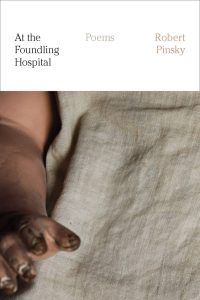» Book Review
Restless Curiosity
At the Foundling Hospital by Robert Pinsky
Farrar, Straus and Giroux, 2016
59 pages, hardbound, $23.00

The threads running through Robert Pinsky’s At the Foundling Hospital are varied enough to provide the topics for a Jeopardy round: music, language and languages, names and naming, identity and origins. And Pinsky’s restless curiosity is mirrored by the various forms these poems assume. There are sonnets, couplet and tercet poems, lists, narrative poems, brief lyrics, and free-associative repetitions. What melds these disparate elements, rendering the book a seamless read, is Pinsky’s cerebral yet human voice.
Taking its cue from the collection’s epigraph from Pindar (“What is someone?”), that voice offers more questions than postulations. Sometimes those questions are explicit, as in “Genesis”: “Where was the kiln, what was the clay? / What drove the wheel that turned the vessel?” At other times the questions are implicit, often involving notions of accepted faith. In “Sayings of the Old” the speaker remembers an acquaintance who “hates the sanctimonious Buddha-goo / But loves to meditate.” And in “Dream Medicine” the speaker recalls a childhood encounter with his father when,
…from the Ford’s back seat,
I asked him, did he believe in Life after Death?
His eyes in the rear-view mirror kind of shrugged,
“I don’t know, probably not,” he said. “Or maybe
Look at it this way: you are my life after death.”
“I’m tired of the gods, I’m pious about the ancestors,” “Creole” begins, an attitude that is evident throughout this book. While Pinsky often pokes and prods at ideas surrounding religious belief, he seems much more interested in people. “The Foundling Tokens” is a beautiful meditation on how the orphaned children were identified by something tangible when they were brought in: “Bit of lace or a pewter brooch, / Identifying coin, button / Or bangle. One crushed thimble, / noted at admission.” The poem expands to include Africans on the slave passage, “the Chinese immigrants / In the dark Angel Island / Internment cells,” and the people who left “a rhyme or name” scraped “Into the very death-compound dirt” of a concentration camp. What did it avail any of them? “…almost never was / A foundling reclaimed, ever.” These poems never flinch from such hard truths, yet they wear those truths lightly, neither celebrating the darkness nor inviting pity in its wake.
Pinsky is widely acknowledged as a contemporary master. Everywhere in this collection I am made aware of a confidence of sensibility and craft, the sense that he can accomplish anything the poems set out to do. Partly that is surely the result of long practice. But there is also generosity of spirit here. The few explicitly narrative poems we do have are concerned as much with other people as they are with the speaker. Pinsky’s impulse is to honor the people who often don’t have a voice, such as the veteran in “Radioman” who matter-of-factly joined another platoon, his having been wiped out in the Battle of the Bulge: “We slept, we ate. / I had another outfit, somewhere to be. / They had a radioman, and that was me.” The abandoned in the Foundling Hospital, his grandmother who delivered wisdom in Yiddish, and childhood friends who have died receive the same fond attention as do Irving Berlin and Ray Charles and God.
There is no axe to grind here, no quarrel with fate (but neither is there complacency). Rather, there is the acknowledgement that the speaker of these poems is corporeal, one among countless. “Procession” begins with a description of the array of telescopes atop Mauna Kea and their ability to travel back through time. Inevitably, that focus leads the speaker to a meditation about our shared human past. “Innumerable names and doings, innumerable / Destinies, remote histories, deities and tongues. / Somewhere among them your ancestor the slave, / Also your ancestors the thief the prince the stranger,” all of them “…traveling a filament of light / Across the nothing between the clouds of being / Into the pinhole iris of your mortal eye.”
The poems in At the Foundling Hospital examine what it is to be human through the microcosm of individual experience. Robert Pinsky—sometimes reverent, sometimes irreverent, but always honest and forthright—is our guide. This book is strong evidence that he deserves the respect he is so often accorded.
Please also see our interview with Robert Pinsky.